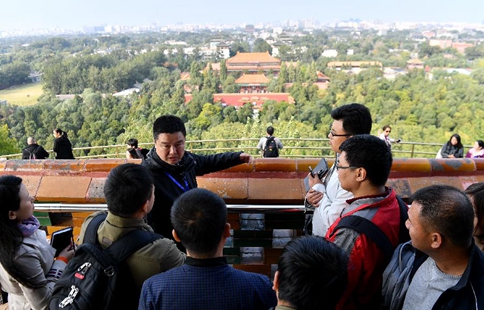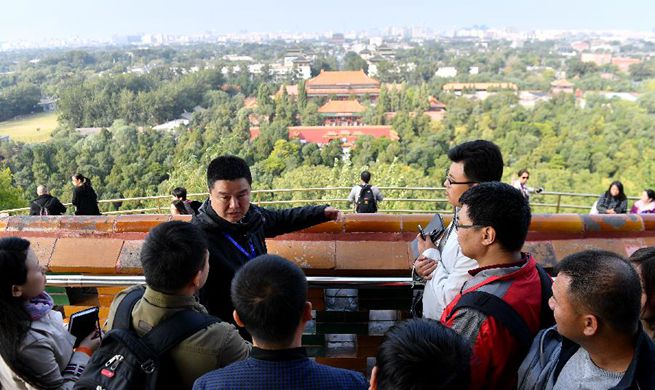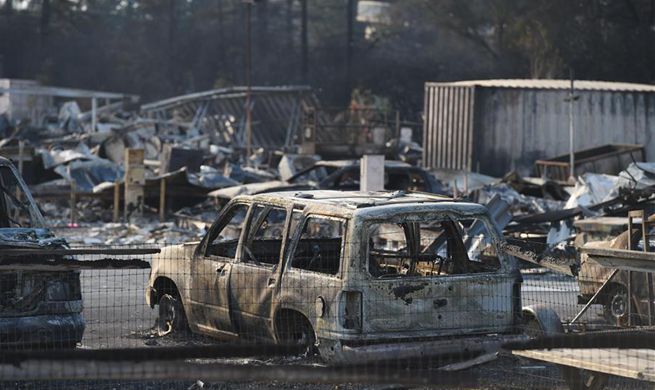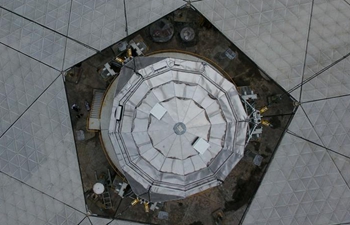by Xinhua writer Shi Xiaomeng
BEIJING, Oct. 13 (Xinhua) -- All roads lead to Rome, so goes an old Western saying. Yet when it comes to building a world free of nuclear threats, the only viable solution is a diplomatic and multilateral one.
On Friday, U.S. President Donald Trump is widely expected to announce he would not certify the Iranian nuclear deal reached in 2015.
The unilateral act would deal a heavy blow to the world's diplomatic efforts to prevent nuclear proliferation and would invite further disturbance in the Middle East.
The landmark deal, known as the Joint Comprehensive Plan of Action (JCPOA), was clinched in 2015 between Iran and the P5+1 -- Britain, China, France, Russia and the United States plus Germany. It was then endorsed by the UN Security Council in a unanimously adopted resolution.
The 15-nation council, in which the United States occupies a permanent seat, has clearly stated that it will gradually lift sanctions imposed on Iran if the UN nuclear watchdog, the International Atomic Energy Agency (IAEA), verifies Iran's compliance with the deal.
So far, the IAEA has issued no warning of Tehran's failure to follow its stated obligations, and international inspectors have proved that Iran is complying with the terms of the deal.
Without mentioning any specific violations by Tehran, Washington's decision not to re-certify the agreement has invited deep doubts over its motives.
It seems what truly concerns Washington is not whether Iran has stayed or will stay faithful to the nuclear accord. The White House frets about the deal because it has become a roadblock to reshuffling its Middle East policy.
Back in years when Barack Obama was in the Oval Office, the former U.S. leader attempted not to take sides in a hostile relationship between Iran, America's arch foe in the Middle East, and Saudi Arabia, Washington's leading traditional partner in the region. Yet in Trump's design for U.S. influence in the area, Washington has sought to backtrack to a more traditional approach that rests on old alliances.
Then came the blame game.
In his speech at UN General Assembly high-level debate last month, Trump accused Iran of using its oil profits to fund terrorists that "kill innocent Muslims and attack their peaceful Arab and Israeli neighbors."
However, scrapping the nuclear deal is hardly wise.
If the decertification triggers the reimposing of U.S. sanctions and a move by Iran to seek a new direction for its nuclear program, it is undoubtedly tantamount to adding insult to injury for the war-torn and instability-ridden Middle East. International diplomatic efforts to manage the situation will be sadly in vain.
Also, Washington's credibility in observing international agreements would be seriously impaired.
Under current international non-proliferation regime, the JCPOA was the result of relentless multilateral negotiations which has brought a peaceful settlement to the Iranian nuclear issue.
To protect the non-proliferation regime, especially when the nuclear issue on the Korean Peninsula is at a fever pitch, all parties to the Iranian nuclear agreement need to preserve the legacy of negotiations and insist on the pact's strict implementation.
Doing so could lend confidence to peacefully addressing nuclear crisis worldwide. Otherwise, the overall anti-proliferation picture could slide into a state of limbo, and cloud all nations on Earth under the shadow of a ruinous nuclear threat.
In this nightmare scenario, Washington faces the same dark future as everyone else, all because it put its own interests above all else.
Washington needs to check its fetish for unilateral and shift to a new, more inclusive approach in handling global nuclear issues. If not, the consequences could be catastrophic.

















